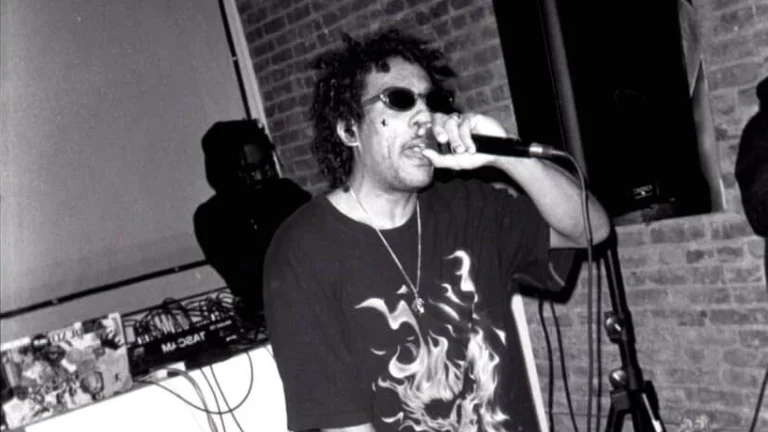“Sad boy is a state of mind,” replies bassist Eve Rosenberg alongside chuckles and grins from bandmates Rafi Cohen and Finn Hodgson while discussing the mood of Sunglasz Vendor and their debut album Unwinding. It is experimental, with wonky guitar riffs abound and lyrics on dating malaise. The perfect listening environment? Lying on a wet bed in your wet dressing towel. A moment of existential hesitation, doing something un-heroic.
When Sunglasz Vendor called, it was from a recording studio in Hither Green, SE London, where the trio are tearing into album two. It’s day five of a ten-day stint with producer Jo Futak. Unwinding, however, was produced with William Carkeet “in the bleak Winter months of 2023 to 2024, barely one year from the band’s first rehearsal.” Producer Carkeet now works on sound design with Jerskin Fendrix, who’s known for the moody soundtracks of legendary film director Yorgos Lanthimos. The album Unwinding holds the same unsteady, sometimes dreary attitude as Poor Things, a far cry from the intense heat we’ve been having in Britain lately. Fittingly, Sunglasz Vendor’s album two will be Spring Break(ers) themed.
Today, Sunglasz Vendor operates firstly in the underbelly of Bristol and London’s experimental scenes, with each member, Cohen, Rosenberg, and Hodgson, coming together from Bingo Fury, Ex-Agent, and Grandchild, respectively. Collectively, they take mostly traditional instruments—drums, guitar, and the like—and codes—rock, jazz, and so on—to bend their sounds into new angular shapes. At times, lethargic guitar, bass, and laid-back atmospheric drums come together with precise intentionality, infused with angst against the depressing climate of the UK. It’s a network of friends, some of whom are in the big time. One of Sunglasz Vendor’s early shows in Bristol was supporting the renowned Squid, before these up-and-comers even had any music released, showing the level of belief the alternative-rock scene had in this band. It helps that Ex-Agent, Bingo Fury, and Grandchild successfully conduct a cinematic meeting of post-rock, jazz, and noise to varying intensity levels. Despite their successes, the members are self-effacing, proven in what’s left unsaid. They make no haughty claims to musical perfection or absolute individuality, like many artists who want to be considered ahead of the crowd.
Interestingly, Unwinding seems to primarily deal with solitude, despite all these social comings and goings, it’s the universal sad boy experience, modern dating ennui, and the escape through comforting food they hone in on. On the album, Cohen’s voice is honest, with a husky cool, confrontational at times in shouts. In person, he’s a real straight talker. Cohen says, “If you’re not doing the thing everyone’s doing, then you inevitably feel alone in your room, in a house you’re renting.” This resounds in the spacious “Save Me Your Time” with distant vocals and wooden drumming like impatient fingers on a table alone. He adds, “The final lyric of the whole album is about poor self-image and self-worth. I basically call myself an amorphous dry blob lacking chocolate chips. It’s rough. That’s obviously quite a horrible thing to say, but it’s quite funny because you’re also talking about chocolate chip cookies.” Detachment and insecurity permeate lyrics like this in the album, layered with gentle strumming shifting through shades of electrified sound. It’s enjoyable music, making the comforting note that loners aren’t alone—a statement of truth rather than how to overcome it.
The project’s ideas about isolation, feeling like an onlooker, are perpetuated by something in society. Cohen, who vulnerably locates it in his lack of confidence, later observes obsessive “curation” of our daily experiences: looking for a nice café online rather than asking a stranger, adds to the solitude. “Life is increasingly about doing the thing that everyone’s doing. If you’re in a big city, it’s going to the show or this play or this exhibition or this new thing.” This band is not interested in trends; instead, they cherish moments of connection, like the varied live shows we all met at. “Brick King” pokes fun at overly full diaries too, barking “Bonus points for pointing out that your dates are competitive / Hard to pin down, hard to save, when the hell’s the last time you rested?” Cohen explains, “I guess in more rural communities generally people have less to do and you’re around more in communal spaces—just seeing the same people every day.” In summary, we need a new town hall, somewhere to meet, and we don’t need to diarize months in advance.
Sunglasz Vendor has uplifting moments, too. Hodgson describes how, on Unwinding, traditional song structures are done away with through “unsticking” and “a sort of peeling away” at the end of tracks where the music becomes a deeply pleasing whirlwind. Without it, “everyone’s quite bored,” Cohen says directly. These moments of freedom and irregularity, like “(unwinded)” particularly, put them in an anarchic category. Yet, when questioned on anarchism, Hodgson banters, “Hard no from me. I believe in the state.” Cohen notes he’s not a scholar on it and adds, “There are two ends of the political compass. There’s anarchy and “Guitar Hero, and I guess we’re kind of centrists in that.” Playful as ever, these cheeky exchanges come to life in this creative outpouring of a record.





